一般过去时态讲解与练习
小学英语一般过去时态讲解及习题ppt课件
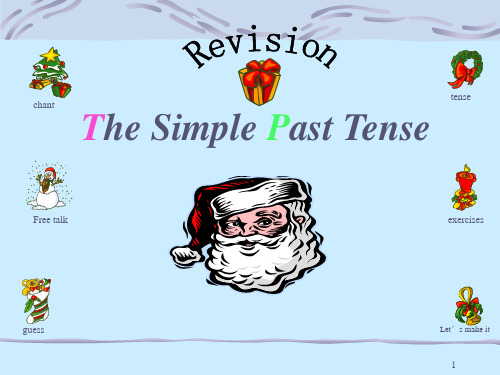
A: What day_i_s_ it today ? B: It _is_ Sunday. A: What day _w_a_s_it yesterday?B: It_w_a_s_Saturday. A: What day _w_a_s_ it the day before yesterday ?
39
It was sunny.
The vacations were great .
How was the weather ? How were the vacations ?
I did my homework yesterday.
What did you …do…?
She played soccer last Sunday.
Did they have…?
My father went to the beach three years ago.
Did your father go…?
Tom and Jack studied for the test three days
ago. Did Tom and Jack study…?
I did my homework yesterday.
Did you do…?
Sshe play…?
He cleaned his room last week.
Did he clean…?
They had a summer camp last weekend.
What did she …do…?
30
Exercise 1. _W_e_r_e_(be) you busy yesterday afternoon? 2. She _w__a_s _ (be) at school this morning. 3. Jane and Ann w__er_e_n_’(tbe not) friends before. 4. He _d_i_d_n_’(tdo not) live in Guangzhou
(完整版)初中一般过去时详细讲解与练习
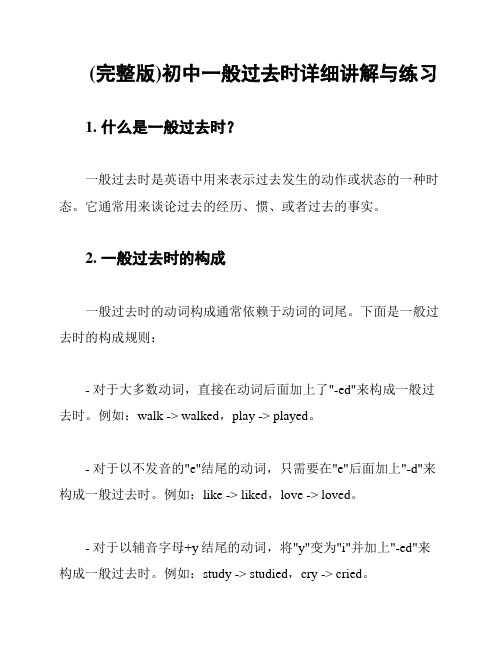
(完整版)初中一般过去时详细讲解与练习1. 什么是一般过去时?一般过去时是英语中用来表示过去发生的动作或状态的一种时态。
它通常用来谈论过去的经历、惯、或者过去的事实。
2. 一般过去时的构成一般过去时的动词构成通常依赖于动词的词尾。
下面是一般过去时的构成规则:- 对于大多数动词,直接在动词后面加上了"-ed"来构成一般过去时。
例如:walk -> walked,play -> played。
- 对于以不发音的"e"结尾的动词,只需要在"e"后面加上"-d"来构成一般过去时。
例如:like -> liked,love -> loved。
- 对于以辅音字母+y结尾的动词,将"y"变为"i"并加上"-ed"来构成一般过去时。
例如:study -> studied,cry -> cried。
- 部分动词的一般过去时需要进行不规则变化。
例如:go -> went,eat -> ate。
3. 一般过去时的用法一般过去时通常用来描述以下情况:- 过去发生的动作:I walked to school yesterday.- 过去的经历:He lived in London for five years.- 过去的事实:She was a teacher in the past.4. 一般过去时的句型练下面是一些练,帮助加深对一般过去时的理解和运用:1. 请用一般过去时填空:Yesterday, I ________ (watch) a movie at home.2. 完成句子:He _____ (visit) his grandparents last summer.3. 改写句子,使用一般过去时:I read a book yesterday. (改为否定句)4. 改写句子,使用一般过去时:They played basketball in the park. (改为疑问句)5. 总结一般过去时是用来表示过去发生的动作或状态的一种时态。
人教版八年级上册一般过去时语法讲解及练习(含答案)

一般过去时语法讲练一、含义一般过去时表示过去某个时间里发生的动作或状态;过去习惯性、经常性的动作、行为。
二、用法(一)表示过去某个时间或某一段时间发生的动作或存在的状态①平时经常的或习惯性的动作,通常用一个实义动词来描述。
She came back home after dinner yesterday.I had a word with Julia this morningHe was in Shanghai last year.They were young four years ago.(二)表示过去经常或反复发生的动作He got up at 7 every day.Mrs. Peter always carried an umbrella.常用used to/would表示过去习惯性动作:He used to visit his mother once a week.The old man would sit on a bench in the quiet park and look at others for hours without doing anything or talking to anybody.(三)有时可替代一般现在时,表达一种婉转、客气、礼貌、商量的语气Would you mind my siting here?(四)时间标志词yesterday, the day before yesterday, last week/year/summer , two/three/days/weeks ago, that morning/winter/day/year, those days/years, at that time/moment, in 1990, just now, in the old days, two hours later, one day, when I was …years old/when I was young…三、句型结构(一)be动词四、动词过去式(过去式)的变化规则(一)直接加edlisten-listened visit-visited walk-walked(二)以e结尾,直接加dlive-lived hope-hoped(三)以辅音字母加y结尾的动词,变y为i加edcarry-carried study-studied(四)以重读闭音节结尾,如末尾只有一个辅音字母,双写辅音字母加edshop-shopped stop-stopped drop-dropped plan-planned fit-fitted prefer-preferredI lived ( live )in Shanghai in 2003.(五)不规则动词过去式的变化需特殊记忆buy-bought go-went read-readI read (read) English yesterday morning.【注意事项】1、一般过去时只说明过去的事情,不强调动作对现在的影响。
超详细一般过去时的全面讲解【附练习与答案】
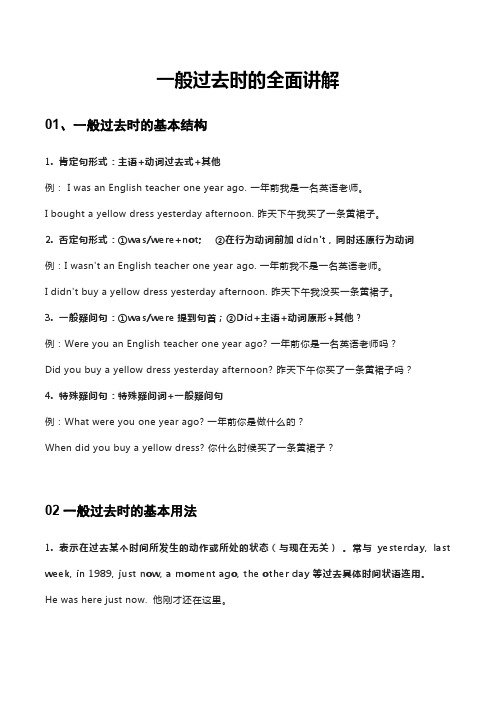
一般过去时的全面讲解01、一般过去时的基本结构1. 肯定句形式:主语+动词过去式+其他例: I was an English teacher one year ago. 一年前我是一名英语老师。
I bought a yellow dress yesterday afternoon. 昨天下午我买了一条黄裙子。
2. 否定句形式:①was/were+not; ②在行为动词前加didn't,同时还原行为动词例:I wasn't an English teacher one year ago. 一年前我不是一名英语老师。
I didn't buy a yellow dress yesterday afternoon. 昨天下午我没买一条黄裙子。
3. 一般疑问句:①was/were提到句首;②Did+主语+动词原形+其他?例:Were you an English teacher one year ago? 一年前你是一名英语老师吗?Did you buy a yellow dress yesterday afternoon? 昨天下午你买了一条黄裙子吗?4. 特殊疑问句:特殊疑问词+一般疑问句例:What were you one year ago? 一年前你是做什么的?When did you buy a yellow dress? 你什么时候买了一条黄裙子?02一般过去时的基本用法1. 表示在过去某个时间所发生的动作或所处的状态(与现在无关)。
常与yesterday, last week, in 1989, just now, a moment ago, the other day等过去具体时间状语连用。
He was here just now. 他刚才还在这里。
What did you do yesterday? 你昨天做了什么事?2. 在过去一段时间内的经常性或习惯性动作。
一般过去时练习题及讲解 2
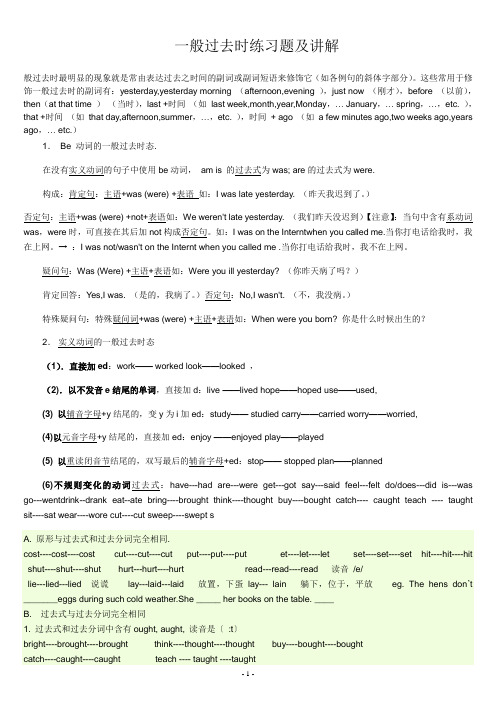
一般过去时练习题及讲解般过去时最明显的现象就是常由表达过去之时间的副词或副词短语来修饰它(如各例句的斜体字部分)。
这些常用于修饰一般过去时的副词有:yesterday,yesterday morning (afternoon,evening ),just now (刚才),before (以前),then(at that time )(当时),last +时间(如last week,month,year,Monday,… January,… spring,…,etc. ),that +时间(如that day,afternoon,summer,…,etc. ),时间+ ago (如a few minutes ago,two weeks ago,years ago,… etc.)1.Be 动词的一般过去时态.在没有实义动词的句子中使用be动词,am is 的过去式为was; are的过去式为were.构成:肯定句:主语+was (were) +表语如:I was late yesterday. (昨天我迟到了。
)否定句:主语+was (were) +not+表语如:We weren't late yesterday. (我们昨天没迟到)【注意】:当句中含有系动词was,were时,可直接在其后加not构成否定句。
如:I was on the Interntwhen you called me.当你打电话给我时,我在上网。
→:I was not/wasn't on the Internt when you called me .当你打电话给我时,我不在上网。
疑问句:Was (Were) +主语+表语如:Were you ill yesterday? (你昨天病了吗?)肯定回答:Yes,I was. (是的,我病了。
)否定句:No,I wasn't. (不,我没病。
)特殊疑问句:特殊疑问词+was (were) +主语+表语如:When were you born? 你是什么时候出生的?2.实义动词的一般过去时态(1).直接加ed:work—— worked look——looked ,(2).以不发音e结尾的单词,直接加d:live ——lived hope——hoped use——used,(3) 以辅音字母+y结尾的,变y为i加ed:study—— studied carry——carried worry——worried,(4)以元音字母+y结尾的,直接加ed:enjoy ——enjoyed play——played(5) 以重读闭音节结尾的,双写最后的辅音字母+ed:stop—— stopped plan——planned(6)不规则变化的动词过去式:have---had are---were get---got say---said feel---felt do/does---did is---was go---wentdrink--drank eat--ate bring----brought think----thought buy----bought catch---- caught teach ---- taught sit----sat wear----wore cut----cut sweep----swept sA. 原形与过去式和过去分词完全相同.cost----cost----cost cut----cut----cut put----put----put et----let----let set----set----set hit----hit----hit shut----shut----shut hurt---hurt----hurt read---read----read 读音/e/lie---lied---lied 说谎lay---laid---laid 放置,下蛋lay--- lain 躺下,位于,平放eg. The hens don’t _______eggs during such cold weather.She _____ her books on the table. ____B. 过去式与过去分词完全相同1. 过去式和过去分词中含有ought, aught, 读音是〔:t〕bright----brought----brought think----thought----thought buy----bought----boughtcatch----caught----caught teach ---- taught ----taught( )1.my father______ill yesterday.a.isn't b.aren't c.wasn't dweren't ( )2.______your parents at home last week﹖a.is b.was c.are d.were ( )3.the twins______in dalian last year.they______here now.a.are; were b.were; are c.was; are d.were; was( )4.______your father at work the day_____yesterday(前天)﹖a.was; before b.is; before c.was; after d.is; after ( )5.—who was on duty last friday﹖—______.a.i am b.i was c.yes, i was d.no, i wasn't ( )6. i cleaned my classroom ___________.a with three hoursb three hours agoc in three hoursd three hours before ( ) 7. i came _______ my house two days ago .a back onb back toc to backd back( ) 8 . ___________? he did some reading at home.a what does your father do yesterday eveningb what does your brother do in the schoolc what did your brother do over the weekend d where did your brother go last sunday ( ) 9. what did you do ________ ? i went to the movies.a next morningb over the weekendc in the weekend d next monday( )10. the koala sleeps _______,but gets up _________.a during the day; at the eveningb at day ;during nightc in the day ;during the eveningd during the day ; at night二、请用正确动词形式填空。
一般过去时态讲解与练习
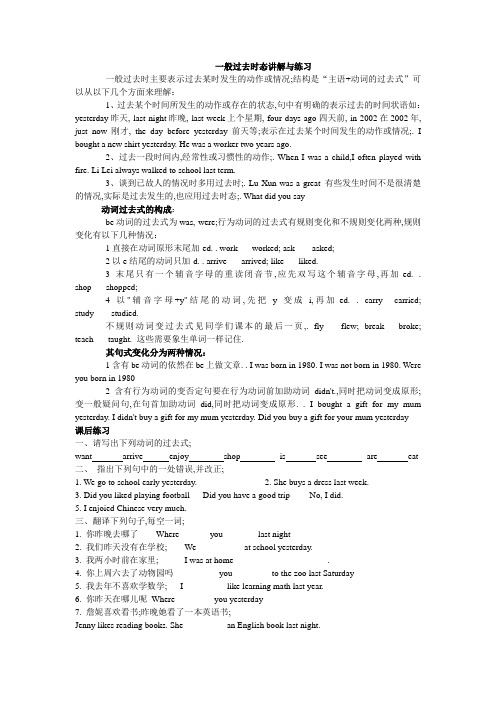
一般过去时态讲解与练习一般过去时主要表示过去某时发生的动作或情况;结构是“主语+动词的过去式”可以从以下几个方面来理解:1、过去某个时间所发生的动作或存在的状态,句中有明确的表示过去的时间状语如:yesterday昨天, last night昨晚, last week上个星期, four days ago四天前, in 2002在2002年, just now刚才, the day before yesterday前天等;表示在过去某个时间发生的动作或情况;. I bought a new shirt yesterday. He was a worker two years ago.2、过去一段时间内,经常性或习惯性的动作;. When I was a child,I often played with fire. Li Lei always walked to school last term.3、谈到已故人的情况时多用过去时;. Lu Xun was a great 有些发生时间不是很清楚的情况,实际是过去发生的,也应用过去时态;. What did you say动词过去式的构成:be动词的过去式为was, were;行为动词的过去式有规则变化和不规则变化两种,规则变化有以下几种情况:1直接在动词原形末尾加-ed. . work-----worked; ask------asked;2以e结尾的动词只加-d. . arrive-----arrived; like-----liked.3末尾只有一个辅音字母的重读闭音节,应先双写这个辅音字母,再加-ed. . shop-----shopped;4以"辅音字母+y"结尾的动词,先把y变成i,再加-ed. . carry----carried; study------studied.不规则动词变过去式见同学们课本的最后一页,. fly------flew; break-----broke; teach-----taught. 这些需要象生单词一样记住.其句式变化分为两种情况:1含有be动词的依然在be上做文章. . I was born in 1980. I was not born in 1980. Were you born in 19802含有行为动词的变否定句要在行为动词前加助动词didn't.,同时把动词变成原形; 变一般疑问句,在句首加助动词did,同时把动词变成原形. . I bought a gift for my mum yesterday. I didn't buy a gift for my mum yesterday. Did you buy a gift for your mum yesterday课后练习一、请写出下列动词的过去式;want arrive enjoy shop is see are eat二、指出下列句中的一处错误,并改正;1. We go to school early yesterday. __________2. She buys a dress last week. ___________3. Did you liked playing football Did you have a good trip --- No, I did. _______5. I enjoied Chinese very much. _______三、翻译下列句子,每空一词;1. 你昨晚去哪了Where ______ you _______ last night2. 我们昨天没有在学校; We __________ at school yesterday.3. 我两小时前在家里; I was at home ______ _______ _______.4. 你上周六去了动物园吗_______ you ________ to the zoo last Saturday5. 我去年不喜欢学数学; I _________ like learning math last year.6. 你昨天在哪儿呢Where ________ you yesterday7. 詹妮喜欢看书;昨晚她看了一本英语书;Jenny likes reading books. She _________ an English book last night.8. 上周六他做什么了他和妈妈去购物了;--- What ________ he _________ last Saturday--- He _________ shopping with his mother.9. 雷锋经常帮助其他人; Lei Feng often ________ other people.10. 我上周没有给你写信; I ________ ________ to you last week.Ⅲ按照括号中的要求改写句子;1. Lucy did her homework at home.改否定句Lucy ___________ ___________ her homework at home.2. She found some meat in the fridge.变一般疑问句___________ she __________ ___________ meat in the fridge3. She stayed there for a week.对划线部分提问__________ ___________ __________ she __________ there4. There was some orange in the cup.变一般疑问句_________ there ___________ orange in the cup5. Li Ming is at school now. 用yesterday 改写句子Li Ming _______ at school yesterday.四、请用正确动词形式填空;1. I _________ an exciting party last weekend. have2. She _______ at home yesterday morning. is3. Tommy __________ TV at his uncle’s last night.watch4. They all _________ to the mountains yesterday morning. go5. My friend, Carol, ________for the math test yesterday evening. study6 They____be on the farm a moment ago.7There____bea shop not long ago.8 Jenny____not goto bed until 11:00 o'clock last night.9 Danny _____read English five minutes ago.10 I _____seeLi Lei ____go out just now.11 He ____dohis homework every day. But he __not doit yesterday.12When I was young, I _____playgames with my friends.13When ____you_____writethis book I _____it last year.14 Did he____have lunch at home五、按照括号中的要求改写句子;11. Lucy did her homework at home.改否定句Lucy ___________ ___________ her homework at home.12. She found some meat in the fridge.变一般疑问句___________ she __________ ___________ meat in the fridge13. She stayed there for a week.对划线部分提问__________ ___________ __________ she __________ there14. There was some orange in the cup.变一般疑问句_________ there ___________ orange in the cup15. Li Ming is at school now. 用yesterday 改写句子Li Ming _______ at school yesterday. 要点攻略牢记四个四,学好过去时在这一单元学习中,我们将要学习一种新的时态,那就是一般过去时;那么该如何正确运用这种时态呢没关系,请记好我帮你总结的四个四,相信你能够了解并能熟练地运用了;四种用法①表示在过去某个时间发生的动作或情况;例如:I went to school at 7:00 yesterday morning.我昨天早晨七点去上学;②表示在过去某个时间存在的状态;例如:She was not at home last night.她昨晚八点没在家;③表示在过去经常或反复发生的动作,常和often经常、always总是、sometimes有时等表示频率的时间状语连用;例如:He often had lunch at school last month.他上个月经常在学校吃午饭;④表示已故的人所做的事情或情况;例如:Ba Jin wrote a lot of novels for us.巴金写了很多部小说;四种时间状语①yesterday及相关短语;例如:yesterday morning/afternoon/evening昨天上午/下午/晚上;②“last+时间状语”构成的短语;例如:last night/month/spring/year昨晚/上个月/去年春天/去年;③“一段时间+ago”组成的短语;例如:three days ago三天以前four years ago四年以前;④“介词+时间名词”组成的短语;例如:in 1999在1999年;on the morning of December 25th在12月25号早上;四种谓语动词的表现形式①be动词的过去式was、were.例如:She was a teacher five years ago.她五年前是一名教师;②行为动词的过去式,分为规则动词和不规则动词两种;规则动词的过去式的构成遵循以下四个规则:1直接在动词后加ed,例如:help-helped; want-wanted等;2以不发音的字母e结尾时,去掉e加ed 即直接加d ,例如:like-liked; use-used等;3以辅音字母y结尾时,把y变成i再加ed,例如:carry-carried; study-studied等;4以重读闭音节结尾,双写最后一个辅音字母再加ed,例如:stop-stopped; shop-shopped等;而不规则动词的过去式则需要我们认真下工夫去记了,例如:go-went; come-came; buy-bought等;③连系动词的过去式;例如:become-becameShe became angry.她生气了;④情态动词的过去式+动词原形;例如:I could swim at the age of five.我五岁时就会游泳了;四种句式的构成①一般过去时态的肯定句式“主语+动词过去式+其它”例如:Jenny bought a skirt yesterday.詹妮昨天买了一件短裙;②一般过去时态的否定句式“主语+didn’t+动词原形+其它”例如:Jenny didn’t buy a skirt yesterday.詹妮昨天没有买短裙;③一般过去时态的一般疑问句式“Did+主语+动词原形+其它”例如:Did Jenny buy a skirt yesterday詹妮昨天买短裙了吗④一般过去时态的特殊疑问句式“疑问词+did +主语+动词原形+其它”例如:What did Jenny buy yesterday詹妮昨天买了什么怎么样通过以上的讲解,你对一般过去时态有所了解并能够熟练地运用了吗希望你越学越进步一般过去时态集中训练营亲爱的同学们,从本单元的学习中,我们又学到了一种新的时态“一般过去时态”;你对它理解并掌握了吗敢不敢来到集中训练营中接受训练呢如果你够勇气的话,就请来吧一训练第一关:小小单词难不到我;请写出下列动词的过去式;wantarriveenjoyshopbuy_see_break_fall二训练第二关:生病的句子能奈我何请在仔细诊断每个句子后,把正确的句子写在横线上;1. We were go to school early yesterday.___________________________________________2. She was buy a dress last week. ___________________________________________3. Did you liked playing football ___________________________________________you have a good trip -No, I didn’t.___________________________________________5. We didn’t flew kites last month.___________________________________________三训练第三关:翻译句子我最棒;请将下列的汉语句子翻译成正确的英语;1 你昨晚去哪了_______________________________________我去了王府井的一家商店;_____________________________2 李明前天想给妈妈买件大衣,但他没有太多的钱;3 我们去年在南京玩得不快乐;___________________________________________参考答案一般过去时态集中训练营一训练第一关:小小单词难不到我;1. wanted2. arrived3. enjoyed4. shopped5. bought6. saw7. broke8. fell二训练第二关:生病的句子能奈我何1. We went to school early yesterday.2. She bought a dress last week.3. Did you like playing football4. -Did you have a good trip-Yes, I did / No, I didn’t.5. We didn’t fly kites last month.三训练第三关:翻译句子我最棒;1. Where did you go yesterday I went to a shop in Wangfujing Street.2. Li Ming wanted to buy a coat for his mother, but he didn’t have much money the day beforeyesterday.3. We didn’t have fun in Nanjing last year.点击语法——一般过去时补遗在上一期报纸中,我们了解了一般过去时态的基本用法和其他的基本常识;这一次呢,我们来聊聊有关一般过去时态的其他事项;1到底何时才用一般过去时态①句中有明确的表示过去的时间状语,表示在过去某个时间发生的动作或情况;如:I went to school at 7:00 yesterday morning.我昨天早晨七点去上学;②句中有明确的表示过去的时间状语,表示在过去某个时间存在的状态;如:She was not at home last night.她昨晚八点没在家;③表示在过去经常或反复发生的动作,常和often经常、always总是、sometimes有时等表示频率的时间状语连用;如:He often had lunch at school last month.他上个月经常在学校吃午饭;④表示已故的人所做的事情或情况;如:Ba Jin wrote a lot of novels for us.巴金写了很多部小说;2动词过去式后的ed到底发什么音规则动词过去式后的“ed”读音时不一样的;那么,有什么不一样呢有这么几句口诀:“清读清,浊读浊,元音结尾还读浊,/t/、/d/之后读/id/;”怎么样,理解吗听我娓娓道来:“清读清”,是指动词以清辅音结尾,那么加的“ed”读作清辅音/t/,如asked /a:skt/,missed /mist/等;动词以浊辅音或元音结尾,那么加的“ed”读作浊辅音/d/,如cleaned /kli;nd/,lived /livd/,played /pleid/等;动词以/t/或/d /结尾,那么加的“ed”读作浊辅音/id/,如started /sta:tid/,studied /sta:did/等;趁热打铁一般过去时态小练习Ⅰ请用正确动词形式填空;1. I _________ an exciting party last weekend.have2. She _______ at home yesterday morning.is3. Tommy __________ TV at his uncle’s last night.watch4. They all _________ to the mountains yesterday morning.go5. My friend, Carol, ________for the math test yesterday evening.studyⅡ翻译下列句子;6.你昨天在哪儿呢Where ________ you yesterday7.詹妮喜欢看书;昨晚她看了一本英语书;Jenny likes reading books. She _________ an English book last night.8.上周六他做什么了他和妈妈去购物了;--- What ________ he _________ last Saturday--- He _________ shopping with his mother.9.雷锋经常帮助其他人;Lei Feng often ________ other people.10.我上周没有给你写信;I ________ ________ to you last week.Ⅲ按照括号中的要求改写句子;11. Lucy did her homework at home.改否定句Lucy ___________ ___________ her homework at home.12. She found some meat in the fridge.变一般疑问句___________ she __________ ___________ meat in the fridge13. She stayed there fora week.对划线部分提问__________ ___________ __________ she __________ there14. There was some orange in the cup.变一般疑问句_________ there ___________ orange in the cup15. Li Ming is at school now.用yesterday改写句子Li Ming _______ at school yesterday.参考答案一般过去时小练习Ⅰ1. had2. was3. watched4. went5. studiedⅡ6. were7. read8. did, do, went9. helped10. didn’t writeⅢ11. didn’t do12. Did, find any13. How long did, stay14. Was any15. was。
一般过去时讲解及练习含答案
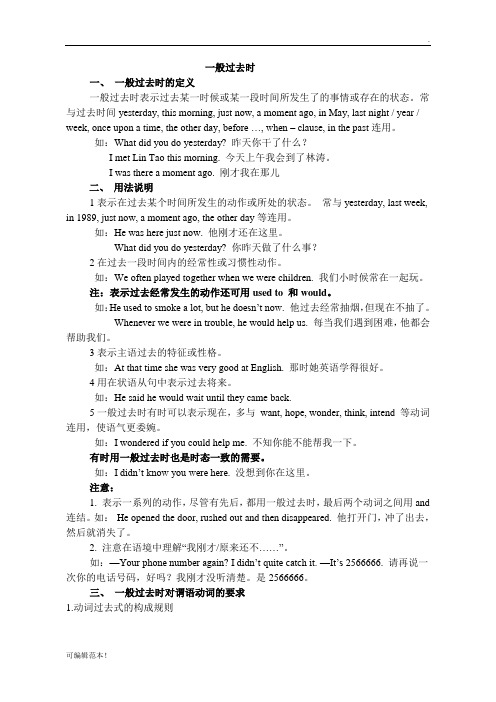
一般过去时一、一般过去时的定义一般过去时表示过去某一时候或某一段时间所发生了的事情或存在的状态。
常与过去时间yesterday, this morning, just now, a moment ago, in May, last night / year / week, once upon a time, the other day, before …, when – clause, in the past连用。
如:What did you do yesterday? 昨天你干了什么?I met Lin Tao this morning. 今天上午我会到了林涛。
I was there a moment ago. 刚才我在那儿二、用法说明1表示在过去某个时间所发生的动作或所处的状态。
常与yesterday, last week, in 1989, just now, a moment ago, the other day等连用。
如:He was here just now. 他刚才还在这里。
What did you do yesterday? 你昨天做了什么事?2在过去一段时间内的经常性或习惯性动作。
如:We often played together when we were children. 我们小时候常在一起玩。
注:表示过去经常发生的动作还可用used to 和would。
如:He used to smoke a lot, but he doesn’t now. 他过去经常抽烟,但现在不抽了。
Whenever we were in trouble, he would help us. 每当我们遇到困难,他都会帮助我们。
3表示主语过去的特征或性格。
如:At that time she was very good at English. 那时她英语学得很好。
4用在状语从句中表示过去将来。
如:He said he would wait until they came back.5一般过去时有时可以表示现在,多与want, hope, wonder, think, intend 等动词连用,使语气更委婉。
一般过去时态讲解和练习题
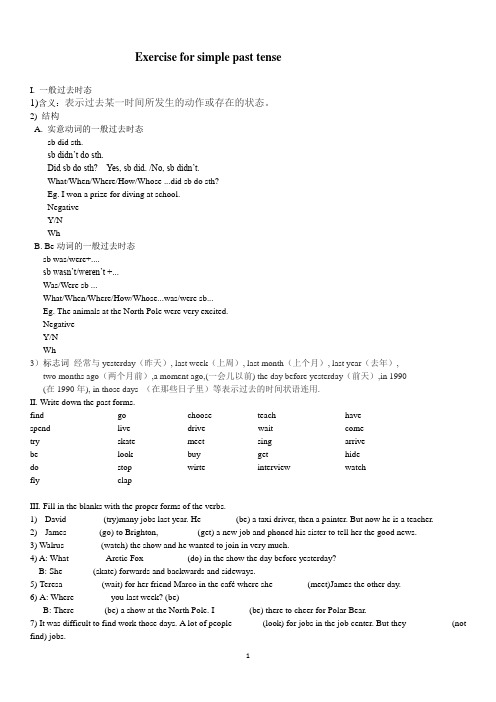
Exercise for simple past tenseI. 一般过去时态1)含义:表示过去某一时间所发生的动作或存在的状态。
2)结构A. 实意动词的一般过去时态sb did sth.sb didn’t do sth.Did sb do sth? Yes, sb did. /No, sb didn’t.What/When/Where/How/Whose ...did sb do sth?Eg. I won a prize for diving at school.Negative___________________________________________________________________Y/N ___________________________________________________________________Wh- ___________________________________________________________________B. Be动词的一般过去时态sb was/were+....sb wasn’t/weren’t +...Was/Were sb ...What/When/Where/How/Whose...was/were sb...Eg. The animals at the North Pole were very excited.Negative___________________________________________________________________Y/N ___________________________________________________________________Wh- ___________________________________________________________________3)标志词经常与yesterday(昨天), last week(上周), last month(上个月), last year(去年), two months ago(两个月前),a moment ago,(一会儿以前) the day before yesterday(前天),in 1990(在1990年), in those days (在那些日子里)等表示过去的时间状语连用.II. Write down the past forms.find go choose teach havespend live drivewait cometry skate meet s ing arrivebe look buy get hidedo stop wirte interview watchfly clapIII. Fill in the blanks with the proper forms of the verbs.1)David________ (try)many jobs last year. He _______ (be) a taxi driver, then a painter. But now he is a teacher.2)James _______(go) to Brighton, ________ (get) a new job and phoned his sister to tell her the good news.3) Walrus________ (watch) the show and he wanted to join in very much.4) A: What ________Arctic Fox _________ (do) in the show the day before yesterday?B: She ______ (skate) forwards and backwards and sideways.5)Teresa ________ (wait) for her friend Marco in the café where she _______ (meet)James the other day.6)A: Where________ you last week? (be)B: There ______ (be) a show at the North Pole. I _______ (be) there to cheer for Polar Bear.7) It was difficult to find work those days. A lot of people ______ (look) for jobs in the job center. But they__________ (not find) jobs.8) Last summer, Jane ______ (spend) nine weeks at an American teenage summer camp as a sports teacher. She _______ (teach) tennis, football and golf to the teenagers. She enjoyed herself.9) ______ Tom Hall________ (arrive)at Shunagliu International Airport 2 hours ago?Yes, he______. You have to go and pick him up now!10) Amanda___________ (not interview) people for jobs last weekend. Susan _________ it for her.(do)11) Where______ James ______ (live) two years ago in London?He______ (live) in Birch Hotel for two months and then he________ (find) a flat(公寓) to live in. Now, he is back to Ireland.12) Seal ______ (sing) a beautiful song at the show. Walrus ______ (watch) her and started_________ (sing) with her.13) Walrus sounded terrible, so Seal_________ (stop) singing and burst into floods of tears.14) ______ Walrus______ (do)well at the show?No, he didn’t. But he ______ (have) a lot of fun.15) How______ Teresa _______ (come) to Madrid to visit her brother?She______ (drive) a car there. It was really a long way to drive!IV.Pattern shift.1)The fans welcomed their favourite actress warmly with bunches of flowers.2)They pulled the boy out of the pond.(Negative)3)The children flew to Beijing on Flight ZA342 last night.4)Tom Hall chose a guidebook to London for his arriving holiday. (Who/ Negative)5)The company provided us with food and accommodation.6)Mum liked watering the flowers in the garden.7)Mr Lee wrote a letter to the footballer who is famous as a new football star. (Y/N)8)Wilf and Wilma did all the jobs. (Who/ Negative)9)Walrus was good at something.(What/ Negative)10)Walrus hid behind a snowdrift.(Where/ Negative)11)Fox was upset because Walrus ruined his act.(Why/ Negative)12)Everyone clapped wildly.( How/ What/ Negetive)。
一般过去时态讲解与练习
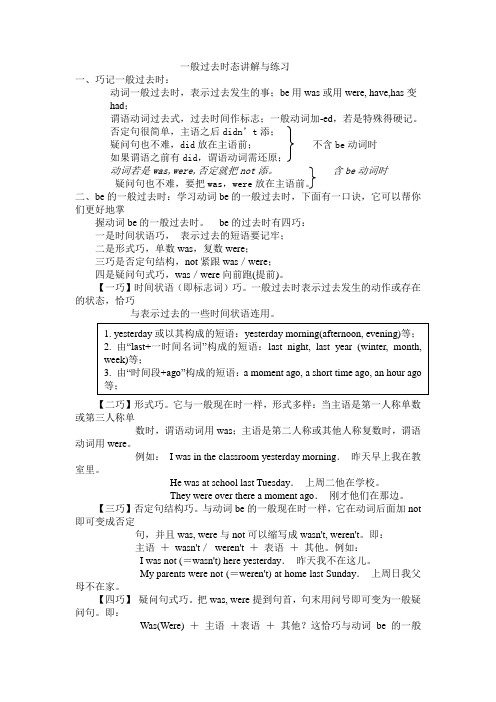
一般过去时态讲解与练习一、巧记一般过去时:动词一般过去时,表示过去发生的事;be用was或用were, have,has变had;谓语动词过去式,过去时间作标志;一般动词加-ed,若是特殊得硬记。
否定句很简单,主语之后didn’t添;疑问句也不难,did放在主语前;不含be动词时如果谓语之前有did,谓语动词需还原;动词若是was,were,否定就把not添。
含be动词时疑问句也不难,要把was,were放在主语前。
二、be的一般过去时:学习动词be的一般过去时,下面有一口诀,它可以帮你们更好地掌握动词be的一般过去时。
be的过去时有四巧:一是时间状语巧,表示过去的短语要记牢;二是形式巧,单数was,复数were;三巧是否定句结构,not紧跟was/were;四是疑问句式巧,was/were向前跑(提前)。
【一巧】时间状语(即标志词)巧。
一般过去时表示过去发生的动作或存在的状态,恰巧与表示过去的一些时间状语连用。
1. yesterday或以其构成的短语:yesterday morning(afternoon, evening)等;2. 由“last+一时间名词”构成的短语:last night, last year (winter, month,week)等;3. 由“时间段+ago”构成的短语:a moment ago, a short time ago, an hour ago等;【二巧】形式巧。
它与一般现在时一样,形式多样:当主语是第一人称单数或第三人称单数时,谓语动词用was;主语是第二人称或其他人称复数时,谓语动词用were。
例如:I was in the classroom yesterday morning.昨天早上我在教室里。
He was at school last Tuesday.上周二他在学校。
They were over there a moment ago.刚才他们在那边。
一般过去时详细讲解与练习

一般过去时讲解与练习一、概念:表示过去时间里发生的动作或存在的状态,或者过去习惯性、经常性的动作。
*句中一般有以下时间状语:1.时间+ago:a moment ago片刻之前;two minutes ago两分钟前;three hours ago三个小时前;fivedays ago五天前;one week ago一周前;six months ago六个月前,four years ago四年前st+时间last time上一次last night昨天晚上last week上个星期last month上个月last term 上个学期last Monday上周一last year去年3. yesterday+时间yesterday morning 昨天早上yesterday afternoon 昨天下午yesterday evening昨天晚上the day before yesterday前天the day before yesterday in the morning前天早上4. one +时间one day有一天one morning一天早上one evening一天晚上one Monday afternoon 一个星期一的下午5.其他时间状语just now刚才once upon a time很久以前in 1980在1980年时the other day 几天前at that time在那时二、基本结构:①主语+谓语(动词过去时)+句子其他成分②主语+was/were+形容词/名词/介词短语+过去时间。
三、主语+谓语(动词过去时)+句子其他成分的句型变化:1.肯定句: I worked in that hospital last year. 我去年在那家医院上班。
2.否定句: I didn’t work in that hospital last year.3.一般疑问句:Did you work in that hospital last year?4.肯定和否定回答: Yes, I did. No, I didn’t.四、主语+was/were+形容词/名词/介词短语+过去时间的句型变化1.肯定句: I was fat three years ago. 我三年前很胖。
一般过去时态总结与习题

一般过去时总结与练习题一构成⑴ be→was— ( am, is 的过去式)were— ( are 的过去式)⑵ V. →V-ed ( 动词过去式)二用法⑴表示过去发生的动作或状态,通常会有明确的表示过去的时间状语。
I went to the zoo yesterday.I stayed up last night ..⑵叙述过去连续发生的动作或状态。
This morning , I got up early , went out for a walk , then came back and cooked for my family .⑶表示过去某一段不确定的时间内发生的动作或状态。
He worked in the store for 5 years.⑷讲故事时用一般过去时,但描述故事发生的背景时用过去进行时。
⑸ used to do sth. 过去常常(习惯)做某事be used to doing sth 一直习惯做某事I used to get up early. 我过去常常早起.I am used to getting up early.我一直都习惯于早起.三、带有确定的过去时间状语时,要用过去时如:yesterday(昨天)、two days ago…(两天前……)、last year…(去年…)、the otherday(前几天)、once upon a time(很久以前)、just now(刚才)、in the old days(过去的日子里)、before liberation(解放前…)、When I was 8 years old(当我八岁时…)、at+一个时间点四、公式⑴be→was / were肯:S.+ was∕were+…否:S.+ wasn’t / weren’t +…肯疑:Was∕Were + S. +…?Yes, S.+ was∕were.No, S.+ wasn’t∕weren’t.否疑:Wasn’t∕Weren’t + S. +…?Yes, S. + was∕were.No, S.+ wasn’t∕weren’t.⑵V. →V-ed肯:S. + V-ed+…否:S. + did not (didn’t )+ V原+…肯疑:Did + S. + V原+…?Yes, S.+ did.No, S.+ didn’t.否疑:Didn’t + S. + V原+…?Yes, S.+ did.No, S.+ didn’t.一、用动词合适的形式填空1.I _____ (watch) a cartoon on Saturday.2. Her father ______(read) a newspaper last night.3. We ______ to zoo yesterday, we _____ to the park. (go)4. _____ you _____ (visit) your relatives last Spring Festival?5. ______ he ______(fly) a kite on Sunday? Yes, he ______.6. Gao Shan _______(put) up the picture last night.7. I _______ (sweep) the floor yesterday, but my mother ____.8. What ______ she ______(find) in the garden last morning? She _______(find) a beautiful butterfly.9. How _______(be) Jim's weekend? It _______(be not) bad.10. ________ (be) your mother a sales assistant last year? No. she __________.11. I _______(have) an exciting party last weekend.12. _________ she ______(practice) her guitar yesterday? No, she _________.13. What ________ Tom _____ (do) on Saturday evening?He ________(watch) TV and ______(read) an interesting book.14. They all ______(go) to the mountains yesterday morning.15. She ______(not visit) her aunt last weekend.She ________ (stay) at home and ______(do) some cleaning.16. When ______ you ______(write) this song?I _______(write) it last year.17. My friend, Carol, ________(study) for the math test and _ ___(practice) English last night.18. ________ Mr. Li _____(do) the project on Monday morning? Yes, he ___二、句型转换1. The children had a good time in the park.否定句:__________________________________________一般疑问句:________________________________________对划线部分提问:____________________________________ 2. There were about nine hundred people at the concert.否定句:__________________________________________一般疑问句:________________________________________ 对划线部分提问:____________________________________ 3. Ann did her homework yesterday evening.否定句:__________________________________________ 一般疑问句:________________________________________ 对划线部分提问:____________________________________ 4. Last week I read an English book.否定句:__________________________________________ 一般疑问句:________________________________________ 肯定/否定回答:____________________________________ 对划线部分提问:____________________________________ 5. My brother was in the park just now.否定句:__________________________________________ 一般疑问句:________________________________________ 对划线部分提问:____________________________________ 三、写出下列动词的第三人称单数形式、过去式形式go _______ _______ enjoy _______ _______buy _______ _______ eat _______ _______get _______ _______ walk _______ _______take _______ _______ dance _______ _______write _______ _______ run _______ _______swim _______ _______ find _______ _______begin _______ _______ eat _______ _______play _______ _______ study _______ _______四、用所给词的适当形式填空。
小学英语一般过去时专项讲解、练习和参考答案
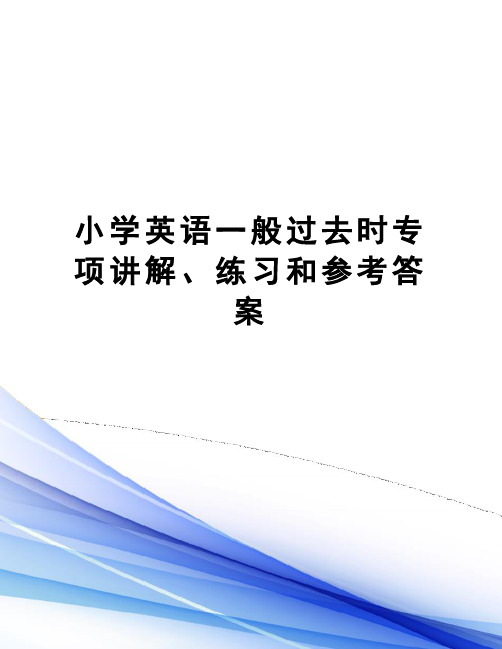
小学英语一般过去时专项讲解、练习和参考答案一般过去时专项讲解与练习一、概念:一般过去时表示过去某一时候发生的动作或存在的状态。
常与一般过去时连用的时间状语有:yesterday; 昨天just now刚才the day before yesterday;前天⋯⋯ago ⋯⋯之前(例如:三天前 three days ago )Last ⋯⋯上一个⋯(例如:上周星期天last Sunday )in 1990在1990年(in+过去时间)二、分类(一) be 动词的一般过去时:肯定句:主语 +be 动词的一般过去时( was/were)否定句:主语+be动词的一般过去时(was/were)+not一般疑问句: be 动词的一般过去时( was/were )+主语(二) there be结构的一般过去时与be 动词的一般过去时的变化基本一致。
(三)一般动词的过去时:肯定句:主语 +动词的过去时( I laughed.)否定句:主语 +did not+ 动词原形( I didn’t laugh.)一般疑问句: Did+主语 +动词原形( Did you laugh?)三.巧记 chant动词一般过去时,表示过去发生事;be 用 was 或用 were, have,has变had;谓语动词过去式,过去时间坐标志;一般动词加 -ed ,若是特殊得硬记。
否定句很简单,主语之后didn ’ t 添;疑问句也不难, did 放在主语前;如果谓语之前有 did ,谓语动词需还原;动词若是 was,were, 否定就把 not 添。
四、习题练习(一)用动词的适当形式填空:1.He ______ (work) in that bank four years ago.2.She ______ (live) in the US last Monday.3.I ______ (see) him yesterday.4.He _______(come) to school at 6 o’clock this morning.5.The boy _______ (have) a bad cold yesterday.6.When _______ you _______ (buy) that house?7.He _______(tell) a story to his daughter yesterday.8._____ you ____ (try) to call me last night?9.What _______you _______ (buy) in the shop?I ______ (buy) a coat just now.10. The doctor ______ (get) up late this morning.11.She ________ (paint) the wall last month.12.My mother _______ (be) a worker 20 years ago.13.________ (be) you here just now?No, I ________ (be not) here.14.Why _______ your brother _______ (cry) last night?15.It ______(be) my mother’s birthday yesterday.(二)翻译下列句子:1.我上周去看爷爷和奶奶了。
一般过去时讲解及答案

一般过去时讲解及答案一、巧记一般过去时:动词一般过去时,表示过去发生的事;be用was或用were, have,has变had;谓语动词过去式,过去时间作标志;一般动词加-ed,若是特殊得硬记。
否定句很简单,主语之后didn’t添;疑问句也不难,did放在主语前;不含be动词时如果谓语之前有did,谓语动词需还原;动词若是was,were,否定就把not添。
含be动词时疑问句也不难,要把was,were放在主语前。
二、be的一般过去时:学习动词be的一般过去时,下面有一口诀,它可以帮你们更好地掌握动词be的一般过去时。
be的过去时有四巧:一是时间状语巧,表示过去的短语要记牢;二是形式巧,单数was,复数were;三巧是否定句结构,not紧跟was/were;四是疑问句式巧,was/were向前跑(提前)。
【一巧】时间状语(即标志词)巧。
一般过去时表示过去发生的动作或存在的状态,恰巧与表示过去的一些时间状语连用。
【二巧】形式巧。
它与一般现在时一样,形式多样:当主语是第一人称单数或第三人称单数时,谓语动词用was;主语是第二人称或其他人称复数时,谓语动词用were。
例如: I was in the classroom yesterday morning.昨天早上我在教室里。
He was at school last Tuesday.上周二他在学校。
They were over there a moment ago.刚才他们在那边。
【三巧】否定句结构巧。
与动词be的一般现在时一样,它在动词后面加not即可变成否定句,并且was, were与not可以缩写成wasn't, weren't。
即:主语+ wasn't/ weren't +表语+其他。
例如:I was not (=wasn't) here yesterday.昨天我不在这儿。
My parents were not (=weren't) at home last Sunday.上周日我父母不在家。
小学英语一般过去时专项讲解、练习和参考答案
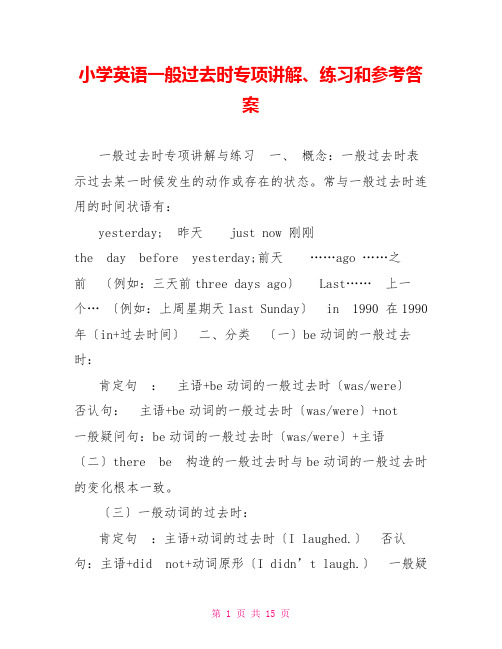
小学英语一般过去时专项讲解、练习和参考答案一般过去时专项讲解与练习一、概念:一般过去时表示过去某一时候发生的动作或存在的状态。
常与一般过去时连用的时间状语有:yesterday; 昨天 just now 刚刚the day before yesterday;前天……ago ……之前〔例如:三天前three days ago〕Last……上一个… 〔例如:上周星期天last Sunday〕 in 1990 在1990年〔in+过去时间〕二、分类〔一〕be动词的一般过去时:肯定句:主语+be动词的一般过去时〔was/were〕否认句:主语+be动词的一般过去时〔was/were〕+not 一般疑问句:be动词的一般过去时〔was/were〕+主语〔二〕there be 构造的一般过去时与be动词的一般过去时的变化根本一致。
〔三〕一般动词的过去时:肯定句:主语+动词的过去时〔I laughed.〕否认句:主语+did not+动词原形〔I didn’t laugh.〕一般疑问句:Did+主语+动词原形〔Did you laugh?〕三.巧记chant 动词一般过去时,表示过去发惹事;be用was或用were, have,has变had;谓语动词过去式,过去时间坐标志;一般动词加-ed,假设是特殊得硬记。
否认句很简单,主语之后didn’t添;疑问句也不难,did放在主语前;假如谓语之前有did,谓语动词需复原;动词假设是was,were,否认就把not添。
四、习题练习〔一〕用动词的适当形式填空:1. He ______(work) in that bank four years ago. 2.She ______ (live) in the US last Monday. 3.I ______ (see) him yesterday.4.He _______(e) to school at 6 o’clock this m orning.5. The boy _______(have) a bad cold yesterday. 6.When _______ you _______ (buy) that house? 7. He _______(tell) a story to his daughter yester day. 8. _____ you ____(try) to call me last night? 9.What _______you _______ (buy) in the shop? I ______ (buy) a coat just now. 10.The doctor ______ (get) up late this morning. 11. She ________ (paint) the wall last month. 12. My mother _______ (be) a worker 20 years ago.13. ________(be) you here just now? No, I ________(be not) here. 14.Why _______ your brother _______(cry) last night? 15. It______(be) my mother’s birthday yesterday. 〔二〕翻译以下句子:1.我上周去看爷爷和奶奶了。
(完整版)中考时态专题一般过去时详细讲解及练习
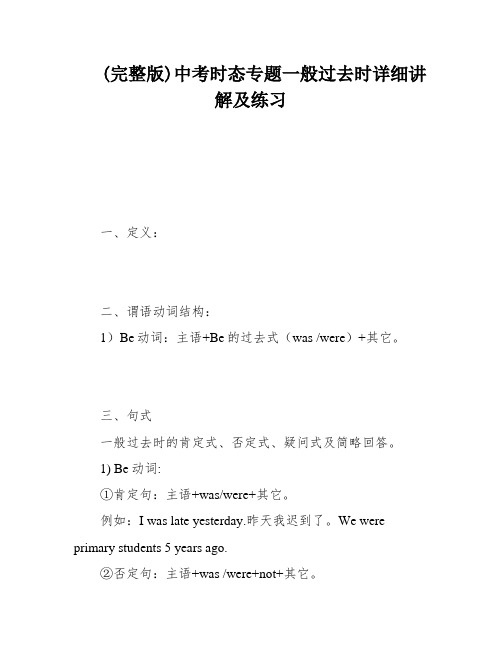
(完整版)中考时态专题一般过去时详细讲解及练习一、定义:二、谓语动词结构:1)Be动词:主语+Be的过去式(was /were)+其它。
三、句式一般过去时的肯定式、否定式、疑问式及简略回答。
1) Be动词:①肯定句:主语+was/were+其它。
例如:I was late yesterday.昨天我迟到了。
We were primary students 5 years ago.②否定句:主语+was /were+not+其它。
例如:___(我们昨天没迟到)③一般疑问句:be动词提前。
Was/Were+主语+其它?例如:I was ___(改一般疑问句) →Were you ill yesterday?(你昨天病了吗?)肯定回答:Yes, I was. (是的,我病了。
)否定回答:No, I wasn't. (不,我没病。
)④特殊疑问句:对谓语动词进行提问的:疑问词+was/were+主语+其它(一般疑问句)?2) 实义动词:①肯定句:主语+V-ed+其它。
例如:I called up my good friend just now.②否定句:主语+didn’t+V原形+其它。
例如:I didn’t argue with Tom last week.③一般疑问句:Did+主语+V原形+其它?例如:___ 2010. (改一般疑问句) →Did you buy a souvenir in 2010?肯定回答:Yes, I did.否定回答:No, I didn’t.④特殊疑问句:疑问词+did+主语+V原形+其它?例如:When did you buy the book?(你是什么时候买的这本书?)Finally, let's fill in the blanks with the correct form of the verb. "Was" should be used for the first blank, "played" for the second, "went" for the third, and "read" for the fourth.5. Tom was upset because he had failed the English test again.6. We moved to Beijing 8 years ago.1. C2. C3. B4. A5. C6. A7. B8. ATom was ___ down because he had failed his English test once again. It had e a recurring problem for him. Eight years ago,my family and I relocated to Beijing. This morning, I asked my friend what time she had arrived at school.1. What did they have for breakfast last week?2. ___?3. Jim ___ she was ___.4. They were not late the day before yesterday.5. Where did you go?6. Did Wei Fang have a good time last summer n? Yes, she did. / No, she didn't.7. Li Hong did not do her ___.8. How did Mr Gao go to work last year?9. Is there tea in the cup?1. Did Wei Fang have a good time last summer n? Yes, she did. / No, she didn't.2. Li Hong did not do her ___.3. How did Mr Gao go to work last year?4. Is there tea in the cup?。
完整版)一般过去时讲解及练习

完整版)一般过去时讲解及练习一般过去时是用来描述在确定的过去时间里所发生的动作或存在的状态。
常见的时间状语有yesterday、an hour ago、the other day、XXX、last night/week/month/year、a moment ago、a week ago、three years ago、just now和in the past等。
例如:“Where did you go just now?”(你刚才去哪了?)。
一般过去时的谓语动词形式为动词的过去式,一般在动词原形后加-ed。
例如:“I was tired last night.”(昨天晚上我很累)和“XXX.”(昨天我们参观了那个博物馆)。
一般过去时的构成有两种方式。
第一种是用was/were+形容词/名词等。
例如:“I was XXX.”(昨天我在家)和“Mr.Green was not a teacher last year.”(去年XXX不是一个老师)。
系动词be的过去式为am/is→was、are→were。
第一人称单数(I)和第三人称单数(he/she/it)用was,第二人称单数(you)和各人称复数(we/you/they)用were。
第二种是用实义动词的过去式+其他成分。
例如:“XXX.”(我妈妈昨天去购物了)和“His uncle worked in Beijing in 2014.”(他叔叔2014年在北京工作)。
一般过去时的句式有三种。
肯定句的形式是主语+was/were+其他或主语+实义动词的过去式+其他。
例如:“XXX.”(上周日我去探望了爷爷)和“I was not at school at this time yesterda y.”(昨天的这个时候我没在学校)。
否定句的形式是主语+did+not+实义动词的原形+其他。
例如:“XXX.”(上周我什么都没买)。
疑问句的形式是Was/Were+主语+其他?例如:“Was she at home yesterday?”(昨天她在家吗?)Did you have a good time last weekend。
(英语)英语一般过去时解题技巧讲解及练习题(含答案)及解析

(英语)英语一般过去时解题技巧讲解及练习题(含答案)及解析一、初中英语一般过去时1.-Have you finished your homework?-Yes, I have. I it this morning.A. finishB. finishesC. finishedD. have finished【答案】C【解析】【分析】句意:你完成你的作业了吗?——是的,我完成了。
我今天早晨完成的。
结合语境可知下文描述的是过去某时发生的动作,故用一般过去时态。
选C。
【点评】英语中的时态主要是借助于时间状语与上下文语境来进行判断。
解答此类题型,首先要注意句子中的时间状语,如果没有则要通过分析上下文,结合语境来判断句子的时态。
英语疑问句中一般具有时态上的对应关系,注意结合这一特点进行区分。
2.I was walking in the street when someone _______ me.A. calledB. was callingC. callsD. call【答案】 A【解析】【分析】句意:我正在街上走这时有人叫我。
状语从句中前后时态要保持一致,根据主句中的was walking可知此处用过去的时态,排除CD;此处call表示短暂性动作,所以不用进行时态,故答案为A。
【点评】考查动词的时态,注意时态的前后一致。
3.—Do you know who invented lights?—Yes, they by Edison.A. inventedB. are inventedC. were inventedD. was invented 【答案】 C【解析】【分析】句意:——你知道谁发明了电灯吗?——是的,它们是被爱迪生发明的。
A. invented发明,一般过去时态; B. are invented被邀请;一般现在时态的被动语态;C. were invented被邀请,一般过去时态的被动语态; D. was invented被邀请,一般过去时态的被动语态,单数。
四种过去时态讲解及习题总结

四种过去时态的讲解及习题(一)一般过去时一、一般过去时1.一般过去时表示过去某个时间发生的动作或存在的状态,常和表示过去的时间状语连用。
一般过去时也表示过去经常或反复发生的动作。
2.Be动词在一般过去时中的变化:⑴am 和is在一般过去时中变为was。
(was not=wasn't)⑵are在一般过去时中变为were。
(were not=weren't)⑶带有was或were的句子,其否定、疑问的变化和is, am, are一样,即否定句在was或were后加not,一般疑问句把was或were调到句首。
3.句中没有be动词的一般过去时的句子否定句:didn't +动词原形,如:Jim went home yesterday.Jim didn't go home yesterday.一般疑问句:在句首加did,句子中的动词过去式变回原形。
如:Jim went home yesterday.Did Jim go home yesterday?特殊疑问句:⑴疑问词+一般疑问句?如:Jim went home yesterday.Did Jim go home yesterday?What did Jim do yesterday?动词过去式变化规则:1.一般在动词末尾加-ed,如:pull-pulled, cook-cooked2.结尾是e加d,如:taste-tasted3.末尾是辅音字母加一个元音字母和一个辅音字母的重读闭音节,应双写末尾的辅音字母,再加-ed,如:stop-stopped4.以“辅音字母+y”结尾的,变y为i,再加-ed,如:study-studied5.不规则动词过去式:一般过去时练习Be动词的过去时练习(1)一、用be动词的适当形式填空1.I _______ at school just now.2.He ________ at the camp last week.3.We ________ students two years ago.4.They ________ on the farm a moment ago.5.Yang Ling ________ eleven years old last year.6.There ________ an apple on the plate yesterday.7.There ________ some milk in the fridge on Sunday.8.The mobile phone _______ on the sofa yesterday evening.二、句型转换1. It was exciting.否定句:________________________________________________ 一般疑问句:____________________________________________ 肯、否定回答:__________________________________________ 2. All the students were very excited.否定句:________________________________________________ 一般疑问句:____________________________________________ 肯、否定回答:__________________________________________ 3. They were in his pocket.否定句:________________________________________________ 一般疑问句:____________________________________________ 肯、否定回答:__________________________________________ Be动词的过去时练习(2)一、用be动词的适当形式填空1.I ______ an English teacher now.2.She _______ happy yesterday.3.They _______ glad to see each other last month.4.Helen and Nancy ________ good friends.5.The little dog _______ two years old this year.6.Look, there ________ lots of grapes here.7.There ________ a sign on the chair on Monday..8.Today _______ the second of June. Yesterday ______ the first of June. It _____ Children's Day. All the students ______ very excited.二、句型转换1. There was a car in front of the house just now.否定句:________________________________________________一般疑问句:____________________________________________肯、否定回答:__________________________________________肯、否定回答:__________________________________________三、中译英1. 我的故事书刚才还在手表旁边。
- 1、下载文档前请自行甄别文档内容的完整性,平台不提供额外的编辑、内容补充、找答案等附加服务。
- 2、"仅部分预览"的文档,不可在线预览部分如存在完整性等问题,可反馈申请退款(可完整预览的文档不适用该条件!)。
- 3、如文档侵犯您的权益,请联系客服反馈,我们会尽快为您处理(人工客服工作时间:9:00-18:30)。
一般过去时态讲解与练习一般过去时主要表示过去某时发生的动作或情况。
结构是“主语+动词的过去式”可以从以下几个方面来理解:1、过去某个时间所发生的动作或存在的状态,句中有明确的表示过去的时间状语如:yesterday(昨天), last night(昨晚), last week(上个星期), four days ago(四天前), in 2002(在2002年), just now(刚才), the day before yesterday(前天)等。
表示在过去某个时间发生的动作或情况。
e.g. I bought a new shirt yesterday. He was a worker two years ago.2、过去一段时间内,经常性或习惯性的动作。
e.g. When I was a child,I often played with fire. Li Lei always walked to school last term.3、谈到已故人的情况时多用过去时。
e.g. Lu Xun was a great writer.4)有些发生时间不是很清楚的情况,实际是过去发生的,也应用过去时态。
e.g. What did you say?动词过去式的构成:be动词的过去式为was, were;行为动词的过去式有规则变化和不规则变化两种,规则变化有以下几种情况:1)直接在动词原形末尾加-ed. e.g. work-----worked; ask------asked;2)以e结尾的动词只加-d. e.g. arrive-----arrived; like-----liked.3)末尾只有一个辅音字母的重读闭音节,应先双写这个辅音字母,再加-ed. e.g. shop-----shopped;4)以"辅音字母+y"结尾的动词,先把y变成i,再加-ed. e.g. carry----carried; study------studied.不规则动词变过去式见同学们课本的最后一页,e.g. fly------flew; break-----broke; teach-----taught. 这些需要象生单词一样记住.其句式变化分为两种情况:1)含有be动词的依然在be上做文章. e.g. I was born in 1980. I was not born in 1980. Were you born in 1980?2)含有行为动词的变否定句要在行为动词前加助动词didn't.,同时把动词变成原形; 变一般疑问句,在句首加助动词did,同时把动词变成原形. e.g. I bought a gift for my mum yesterday. I didn't buy a gift for my mum yesterday. Did you buy a gift for your mum yesterday?课后练习一、请写出下列动词的过去式。
want arrive enjoy shop is see are eat二、指出下列句中的一处错误,并改正。
1. We go to school early yesterday. __________2. She buys a dress last week. ___________3. Did you liked playing football ? _______4.--- Did you have a good trip ? --- No, I did. _______5. I enjoied Chinese very much. _______三、翻译下列句子,每空一词。
1. 你昨晚去哪了?Where ______ you _______ last night?2. 我们昨天没有在学校。
We __________ at school yesterday.3. 我两小时前在家里。
I was at home ______ _______ _______.4. 你上周六去了动物园吗?_______ you ________ to the zoo last Saturday?5. 我去年不喜欢学数学。
I _________ like learning math last year.6. 你昨天在哪儿呢?Where ________ you yesterday?7. 詹妮喜欢看书。
昨晚她看了一本英语书。
Jenny likes reading books. She _________ an English book last night.8. 上周六他做什么了?他和妈妈去购物了。
--- What ________ he _________ last Saturday?--- He _________ shopping with his mother.9. 雷锋经常帮助其他人。
Lei Feng often ________ other people.10. 我上周没有给你写信。
I ________ ________ to you last week.Ⅲ按照括号中的要求改写句子。
1. Lucy did her homework at home.(改否定句)Lucy ___________ ___________ her homework at home.2. She found some meat in the fridge.(变一般疑问句)___________ she __________ ___________ meat in the fridge?3. She stayed there for a week.(对划线部分提问)__________ ___________ __________ she __________ there?4. There was some orange in the cup.(变一般疑问句)_________ there ___________ orange in the cup?5. Li Ming is at school now. (用yesterday 改写句子)Li Ming _______ at school yesterday.四、请用正确动词形式填空。
1. I _________ an exciting party last weekend. (have)2. She _______ at home yesterday morning. (is)3. Tommy __________ TV at his uncle’s last night.(watch)4. They all _________ to the mountains yesterday morning. (go)5. My friend, Carol, ________for the math test yesterday evening. (study)6 They____(be) on the farm a moment ago.7There____(be)a shop not long ago.8 Jenny____(not go)to bed until 11:00 o'clock last night.9 Danny _____(read )English five minutes ago.10 I _____(see)Li Lei ____(go) out just now.11 He ____(do)his homework every day. But he __(not do)it yesterday.12When I was young, I _____(play)games with my friends.13When ____you_____(write)this book? I _____it last year.14 Did he____(have) lunch at home?五、按照括号中的要求改写句子。
11. Lucy did her homework at home.(改否定句)Lucy ___________ ___________ her homework at home.12. She found some meat in the fridge.(变一般疑问句)___________ she __________ ___________ meat in the fridge?13. She stayed there for a week.(对划线部分提问)__________ ___________ __________ she __________ there?14. There was some orange in the cup.(变一般疑问句)_________ there ___________ orange in the cup?15. Li Ming is at school now. (用yesterday 改写句子)Li Ming _______ at school yesterday.发音的字母e结尾时,去掉e加ed (即直接加d) , 例如:like-liked; use-used等;3)以辅音字母y结尾时,把y变成i再加ed, 例如:carry-carried; study-studied等;4)以重读闭音节结尾,双写最后一个辅音字母再加ed, 例如:stop-stopped; shop-shopped等。
而不规则动词的过去式则需要我们认真下工夫去记了,例如:go-went; come-came;buy-bought等。
③连系动词的过去式。
例如:become-became She became angry. 她生气了。
④情态动词的过去式+动词原形。
例如:I could swim at the age of five. 我五岁时就会游泳了。
四种句式的构成①一般过去时态的肯定句式“主语+动词过去式+其它”例如:Jenny bought a skirt yesterday. 詹妮昨天买了一件短裙。
②一般过去时态的否定句式“主语+didn’t+动词原形+其它”例如:Jenny didn’t buy a skirt yesterday.詹妮昨天没有买短裙。
③一般过去时态的一般疑问句式“Did+主语+动词原形+其它”例如:Did Jenny buy a skirt yesterday? 詹妮昨天买短裙了吗?④一般过去时态的特殊疑问句式“疑问词+did +主语+动词原形+其它”例如:What did Jenny buy yesterday? 詹妮昨天买了什么?怎么样?通过以上的讲解,你对一般过去时态有所了解并能够熟练地运用了吗?希望你请在仔细诊断每个句子后,把正确的句子写在横线上。
